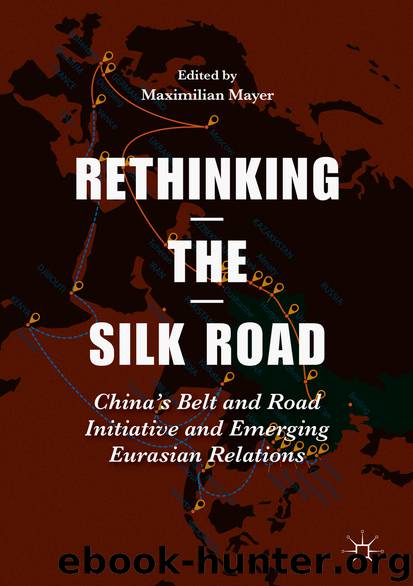Rethinking the Silk Road by Maximilian Mayer

Author:Maximilian Mayer
Language: eng
Format: epub
Publisher: Springer Singapore, Singapore
Japan’s Central Asia Diplomacy
In the foreign relations of Central Asia , China’s BR is well-known, while Japan’s earlier Silk Road Diplomacy and Central Asia Plus Japan initiative are less known. By reviewing Japan’s diplomatic history in Central Asia, this section seeks to outline the continuity of economic and strategic ambitions in this region. In particular, it highlights Japan’s acceptance of state-led development and gradual reform in the region as well as promotion of regional integration, and energy and infrastructure cooperation in economic policy, without hegemonic ambitions in strategic policy.
After the collapse of the Soviet Union, Japan gradually started diplomacy and official development aid in Central Asia. Even though the newly independent republics were members of the European Bank for Reconstruction and Development (EBRD) , Japan succeeded in lobbying for these states to be admitted into the Asian Development Bank (ADB) as well, so they could benefit from loans from both banks in this unprecedented arrangement.18 In 1997, Japan announced its Silk Road Diplomacy, focusing on Central Asia and the Caucasus, when Japanese diplomats had realized the geopolitical importance of the region.19 Part of the Silk Road Diplomacy was to help Central Asia play a role as a buffer region for the maintenance of peace among powers like China, Russia , Afghanistan, and Iran, and part of it was to have access to energy resources. Japan realized at that time, however, that access to energy and commercial interests there were difficult to achieve because of poor infrastructure and limited intra-regional integration in Central Asia. It thus adopted an approach of promoting regional integration, especially in communication, transportation, and energy networks within Central Asia.
Japan’s Silk Road Diplomacy from the late 1990s to early 2000s had a component of exporting Japan’s development model there. While the Western countries pushed for drastic marketization in combination with strong monetary and fiscal tightening within a short period, Japan tried to present the “Japan/East Asia model” as one of the alternatives, in which the government plays a major role in the market economy. Central Asian states with their more authoritarian governments than Western democracies were considered easier recipients of Japan’s model.20 Moreover, even though Japan supported democratization in Central Asia as Western countries did, Japanese diplomats observed that the people of Central Asia preferred “stability of life to democratization if the latter brings uncertainty to their livelihood”. Japan therefore judged that “the imposition of ‘the Western standard’ did not always have a beneficial effect.” In contrast, Tokyo thought that democratization should be allowed to permeate slowly, in balance with nation building and achievement of stability.21
As a continuation of the Silk Road Diplomacy set out in 1997, in 2004 Japan inaugurated the Central Asia Plus Japan initiative. In 2006, Japanese Prime Minister Junichiro Koizumi visited Kazakhstan and Uzbekistan , which was widely perceived as an attempt to secure energy resources for Japan in the context of stronger influence of Russia and China in the region. The Japanese Ambassador to Kazakhstan Tetsuo Ito reportedly said, “We attach great importance to the abundance of natural resources in this region as a stable source of energy supply.
Download
This site does not store any files on its server. We only index and link to content provided by other sites. Please contact the content providers to delete copyright contents if any and email us, we'll remove relevant links or contents immediately.
| Anthropology | Archaeology |
| Philosophy | Politics & Government |
| Social Sciences | Sociology |
| Women's Studies |
The Secret History by Donna Tartt(19037)
The Social Justice Warrior Handbook by Lisa De Pasquale(12183)
Thirteen Reasons Why by Jay Asher(8887)
This Is How You Lose Her by Junot Diaz(6873)
Weapons of Math Destruction by Cathy O'Neil(6263)
Zero to One by Peter Thiel(5784)
Beartown by Fredrik Backman(5734)
The Myth of the Strong Leader by Archie Brown(5495)
The Fire Next Time by James Baldwin(5429)
How Democracies Die by Steven Levitsky & Daniel Ziblatt(5211)
Promise Me, Dad by Joe Biden(5141)
Stone's Rules by Roger Stone(5080)
A Higher Loyalty: Truth, Lies, and Leadership by James Comey(4947)
100 Deadly Skills by Clint Emerson(4917)
Rise and Kill First by Ronen Bergman(4776)
Secrecy World by Jake Bernstein(4739)
The David Icke Guide to the Global Conspiracy (and how to end it) by David Icke(4699)
The Farm by Tom Rob Smith(4501)
The Doomsday Machine by Daniel Ellsberg(4483)
